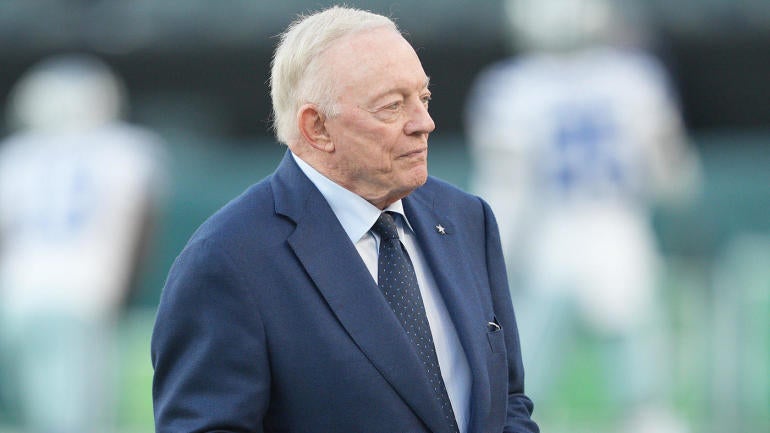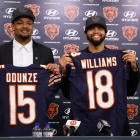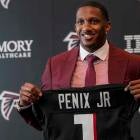
The Dallas Cowboys have long been known as "America's Team" and certainly Texas' preferred team, thanks to their status as the NFL and the world's most valuable sports franchise plus the five Super Bowl titles.
However, all five of those championships occurred nearly 30 years ago with only one being won since the NFL instituted a salary cap in 1994 when the Cowboys won it all in 1995. That title cemented Dallas as the first team in league history to win three Super Bowls in a four-season span (1992, 1993 and 1995). Since then, the Cowboys have made more history with 13 consecutive playoff trips ending without an appearance in the conference championship round, the longest-such streak in NFL history.
The latest run of regular-season success -- three consecutive 12-win seasons (2021-23) for the first time since the 1990's glory years -- ending short of the league's final four may be their most disappointing stretch yet. These Cowboys, under head coach Mike McCarthy, became the first team in NFL history to have three 12-win seasons in a row and not make it out of the divisional round in each of those years.
The latest sour note, a 48-32 home loss in the wild-card round as the NFC's No. 2 seed against the seventh-seeded Green Bay Packers, was a defeat Dallas owner and general manager Jerry Jones labeled "the most painful" in his 35 years owning the team with all the "great expectation and hope" he had for the 2023 Cowboys.
So, of course, Jones -- always the showman and entertainer -- declared the 2024 offseason would be different and that he would " be all in" and throw caution to the wind to "push the hell out of" the 2024 season.
One problem. In order for the Cowboys to have had the salary cap room to execute being "all in," they needed to extend 2023 NFL MVP runner-up quarterback Dak Prescott ($59.5 million cap hit in final year of contract in 2024, second highest in NFL behind only Browns quarterback Deshaun Watson's $64 million) and 2023 receptions leader wide receiver CeeDee Lamb (fully guaranteed $17.991 million fifth-year option in 2024) prior to the start of free agency. That way, Dallas would have been able to lock in its top players to rates before their positional markets jump again and spread its money out across future seasons.
Instead, no big-money deals have been handed out, and Dallas' only external free agency signing thus far is 32-year-old linebacker Eric Kendricks. They have also re-signed cornerback Jourdan Lewis, running back Rico Dowdle, special teams ace C.J. Goodwin, long snapper Trent Sieg and backup offensive lineman Chuma Edoga to one-year deals.
Jones has since clarified that his mantra for the offseason is to "get it done with less." Dallas will certainly have less veteran talent in 2024 as numerous starters and/or rotational contributors in 2023 have walked, signing with new teams.
- RB Tony Pollard (Signed three-year, $21.75 million deal with $10.49 million guaranteed with Tennessee Titans)
- C Tyler Biadasz (Signed four-year, $29.25 million deal -- $4.2 million guaranteed -- with Washington Commanders)
- DE Dorance Armstrong (Signed three-year, $33 million deal -- $16.125 million fully guaranteed -- with Washington Commanders)
- LT Tyron Smith (Signed one-year, $6.5 million contract with an additional $13.5 million possible through incentives with New York Jets)
- DE Dante Fowler Jr. (Signed one-year, $3.25 million deal with $1.43 million guaranteed with Washington Commanders)
- DT Johnathan Hankins (Signed with Seattle Seahawks on a one-year, $2.05 million contract)
- DT Neville Gallimore (Signed one-year, $1.79 million deal with Miami Dolphins)
Trading places?
The Cowboys' 2024 offseason activity pales in comparison to their NFL little brother to the south -- the New York Mets to their New York Yankees -- the Houston Texans. The Texans were created as an expansion franchise in 2002 in the wake of the Oilers moving to Nashville and becoming the Tennessee Titans, and like Dallas, they haven't reached a conference championship game in the 21st century.
Although that may change since the Texans have actually executed an "all in" offseason. General manager Nick Caserio drafted both of the league's offensive (second overall pick quarterback C.J. Stroud) and defensive (third overall pick defensive end Will Anderson Jr.) Rookies of the Year in 2023, and he decided it was time to do whatever it took to surround their young, foundational pieces with talent while they are both still on their rookie deals. Makes sense considering the Texans became the first team in NFL history to win a division with a rookie quarterback and rookie head coach (DeMeco Ryans) as well as just the third team since at least 1950 to win a playoff game with a rookie head coach and quarterback combination.
Houston's 2024 offseason is historic: The Texans are the first team in NFL history to add a player coming off a season with 100 or more catches (traded for four-time Pro Bowl wide receiver Stefon Diggs on Wednesday), 1,000 or more rushing yards (traded for Pro Bowl running back Joe Mixon) and 10 or more sacks (defensive ends Danielle Hunter and Denico Autry) in the same offseason, per CBS Sports Research.
Texans' notable offseason additions
| Player | Acquired | Additional details |
|---|---|---|
WR Stefon Diggs | Trade with Bills | Sent 2025 second-round pick from Vikings to Bills for Diggs, 2024 sixth-rounder, 2025 fifth-rounder |
DE Danielle Hunter | Free agency | Signed two-year, $49 million deal with $48 million guaranteed |
RB Joe Mixon | Trade with Bengals | Sent 2024 seventh-rounder to Bengals for Mixon, signed him to two-year extension (contract runs through 2026) |
DE Denico Autry | Free agency | Signed three-year, $21.5 million deal with $10.5 million guaranteed |
Free agency | Signed three-year, 34 million deal with $21.5 million guaranteed | |
CB Jeff Okudah | Free agency | Signed one-year, $4.75 million deal with $2.5 million guaranteed |
* First team in NFL history to add a player coming off a season with 100+ catches (Stefon Diggs), 1,000+ rush yards (Joe Mixon) and 10+ sacks (Danielle Hunter/Denico Autry) in the same offseason
Even more remarkable about the contrast in offseason moves between the Cowboys and Texans is their similar amounts of dead money on their salary caps. Dallas has $24.7 million in dead cap across the next two seasons, but Houston has a similar number: $23.8 million with all of it on its cap in 2024, per OverTheCap.com
The other notable juxtaposition is their quarterback contract situations with Prescott commanding a top-of-the-market deal while Stroud enters Year 2 of his NFL career. Plus, if the Cowboys do let Dak walk as a free agent in 2025, they would absorb a $40.4 million dead cap hit. However, Jones and the Cowboys never did for Prescott on his rookie deal what the Texans are doing for Stroud now: spending big on external talent to maximize their salary cap space and contention window.
Sure, Dallas traded a first-round pick to acquire Pro Bowl wide receiver Amari Cooper from the Raiders back in 2018, but shortly after re-signing him to a five-year, $100 million contract in the 2020 offseason, the Cowboys decided to pinch pennies. They flipped him, right as he turned 28 years old, and a 2022 sixth-round pick to the Cleveland Browns in exchange for a fifth- and a sixth-round pick in the 2022 offseason.
Prescott, Lamb and Cooper played together for just two seasons as Jones decided it was better to re-sign his own 2018 third-round pick receiver Michael Gallup coming off a torn ACL to a five-year, $57.5 million deal and franchise-tag his own 2018 fourth-round pick tight end Dalton Schultz. Dallas designated Gallup as a post-June 1 release this offseason after he failed to live up to the contract, and the Cowboys let Schultz walk in free agency the previous offseason to, you guessed it, the Texans. He re-signed with Houston on a three-year, $36 million extension this offseason.
That's the difference between Houston and Dallas right now: The Texans are truly "all in" on being a contender with their young quarterback while the Cowboys opted to lean exclusively into their draft-and-develop school of thought to their own detriment. It certainly wouldn't be surprising to see Houston beat its in-state big brother to be the first Texas NFL team to reach a conference championship game and/or a Super Bowl in the 21st century after observing both organization's team-building approaches the last couple of years.
Just two or three years ago, that statement would have been jaw-dropping. Today, it's logical.






















